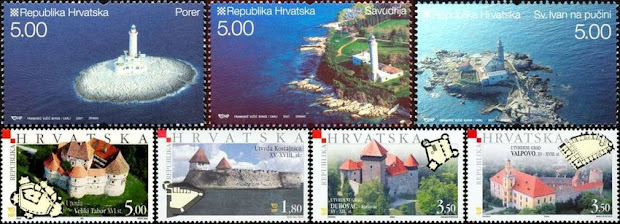Croats love conspiracy theories. Also, they are very touchy when it comes to their beautiful homeland. Therefore, if someone criticizes Croatia it must be that that person has a reason, a hidden motive for doing so. After a critical BBC report about crime and corruption in Croatia, Croatian politicians resorted to stereotype conspiracy theories.
More about that later. First the critique on Croatia. Yesterday I
referred to a BBC article, which was actually based on a BBC Radio 4 report. You can listen to it
online. The essence is that on the surface Croatia is a fantastic country, but underneath... Corruption, organized crime, murder.
As if that was not enough, the
The Economist ran a worrying article on Croatia too. Already the title "A Balkan state in balk" is considered offensive by many Croats, as they believe that Croatia is not a Balkan country. The article mostly concerns the Slovenian blockade of Croatia's EU negotiations.

The sting, however, is in this passage: "Even without the Slovene problem, the Croats have a lot still to do to satisfy Brussels. One big difficulty will be a reform of shipbuilding, which employs as many as 17,000 people, but survives only with huge subsidies. Other profferings of public largesse designed to sweeten voters before the local elections are also causing trouble. Many economists said the government could not afford the public-sector wage rises of 6% it announced in January. Now deteriorating public finances have forced a humiliating reversal of the decision. The IMF has joined critics in arguing that Croatia must shrink its public sector."
I think
The Economist is perfectly right. Croats are led to believe that the border dispute with Slovenia is the only thing that keeps Croatia out of the EU. Economic reforms, which are so necessary, are hardly being discussed. A great deal of Croatia's moribund industry and agriculture might be wiped out by European competition once the protective tariffs are eliminated. It is very difficult to find out how high the import tariff (or legalized theft, if you like) for, say, wine is, but a glance at the wine section of a Croatian supermarket tells me it is pretty high. There are not many foreign wines on the shelves, and those available are ridiculously expensive.
How did Croatian politicians respond to these harsh articles? Let me start saying that I can perfectly understand that Croatia is unhappy with these negative reports. Foreign tourists are supposed to save the Croatian economy and tourism is a very vulnerable sector. If some shit happens in Kosovo, people rule out Croatia as a holiday destination. As simple as that.
Instead of taking some criticism to heart, prime minister Sanadar said: "Some regret that we have more and more tourists", suggesting that other countries envy Croatia for its competitive edge in tourism. Other ministers used words like "malicious", "biased" and "vicious". I heard Foreign Minister Gordan Jandroković saying that is it suspicious that this report came right at the beginning of the tourist season... Or take the opening
sentence of the HRT website: "It seems that the British media are united in depicting Croatia as a Third World country". Well, we are talking about the state-run national TV here. Self-reflection is not their strongest point.
It reminds me of the Croatian
anger over an Australian TV show about the apathetic attitude of Dubrovnik's police when an Austrian girl went missing. Why are they doing this to us? They hate us. They want to harm Croatia. That is the typical childish response.
 Google Maps incorrectly still thinks the highway doesn't go further south than Šestanovac. A 45 minute flight Zagreb-Dubrovnik should cost no more than 300 kuna if you book a last minute or far in advance. Dubrovnik's famous city walls welcomed 9 percent less visitors in the first five months of 2009 than in the same period last year, so hajde!.
Google Maps incorrectly still thinks the highway doesn't go further south than Šestanovac. A 45 minute flight Zagreb-Dubrovnik should cost no more than 300 kuna if you book a last minute or far in advance. Dubrovnik's famous city walls welcomed 9 percent less visitors in the first five months of 2009 than in the same period last year, so hajde!. Annually 800.000 tourists walk on the thick walls, resisting the temptation to jump in the Adriatic. Some dare devils do jump, though from the rocks right below the walls.
Annually 800.000 tourists walk on the thick walls, resisting the temptation to jump in the Adriatic. Some dare devils do jump, though from the rocks right below the walls.


















